The Revolution Of AI in Retail
AI is revolutionizing the retail industry, with the global AI in the retail market projected to reach $85.07 billion by 2032, expanding at 31.8% over the forecast period. At present, a significant majority of retailers (87%) already utilize AI, and 60% plan to increase AI investments.
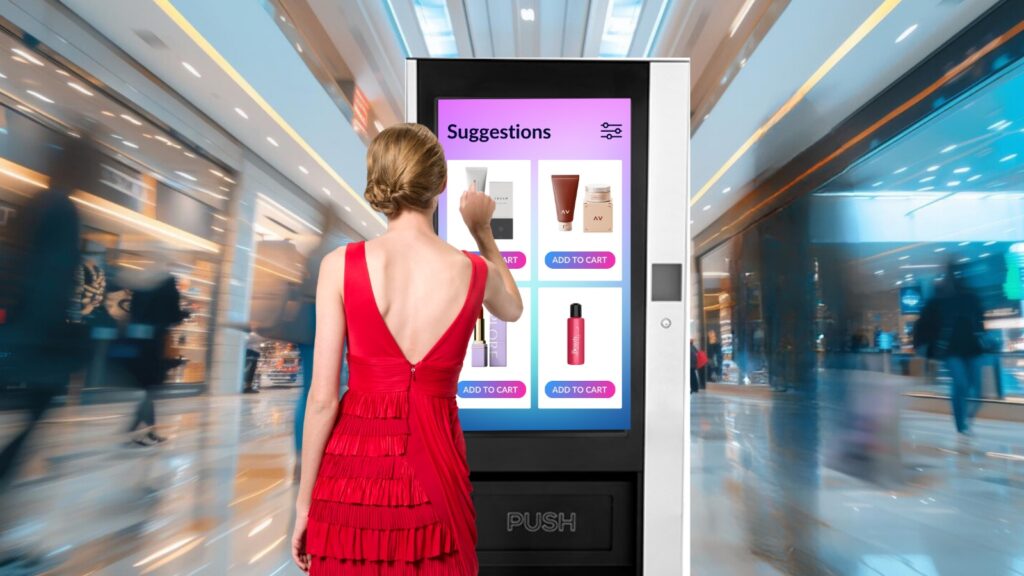
This widespread adoption is driven by substantial returns with AI is estimated to generate an additional $310 billion for the retail sector, with 72% of retailers experiencing reduced operational costs and 69% seeing increased revenue.
Beyond the numbers, AI empowers retailers to enhance customer experiences, improve operational efficiency, drive business growth, and strengthen their brands.
Understanding AI in Retail: What Does It Mean?
AI in retail empowers retailers with intelligent tools to simplify workflows, maximize efficiency, and enhance customer experience. Key AI applications include contact-point automation (e.g., smart vending machines), data-driven insights, optimized inventory and floor space, and waste reduction. Retailers also leverage AI marketing for strategic promotions.
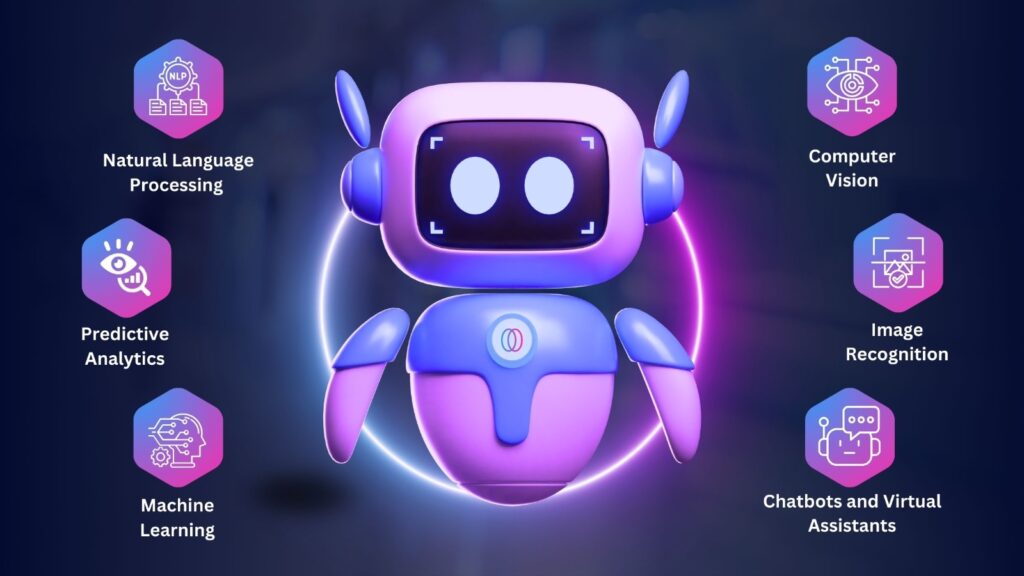
Furthermore, retailers are using AI marketing in promotional strategies in a number of different ways:
- Personalized recommendations based on customer data
- Virtual shopping assistants for real-time support while online product browsing/shopping
- Virtual try-ons (VR technology) for better product selection in the fashion and beauty industry
- Customer segmentation, so that the right message is communicated to the right customers
- Dynamic pricing, by automated analysis of market trends, buyer behavior, and brand competition
- Predictive analytics in sales promotions with strategies like BOGO, financing promotions, percentage discounts, etc.
Some of the most popular AI tools that retailers use these days include:
- Natural Language Processing (NLP): Enables retailers to understand and interpret customer sentiment and language.
- Computer Vision: Allows analysis of visual data like images and videos for tasks such as inventory tracking and customer behavior analysis.
- Predictive Analytics: Forecasts future demand, optimizes inventory, and anticipates customer needs.
- Image Recognition: Automates product tagging and categorization, enabling personalized recommendations.
- Machine Learning: Powers many of the AI applications in retail, enabling continuous learning and improvement of algorithms.
- Chatbots and Virtual Assistants: Provide instant customer support, answer queries, and assist with tasks like order tracking.
These tools work together to create a seamless shopping experience by personalizing interactions and offering relevant product recommendations, tailored offers and customized support. It also improves efficiency significantly by automating tasks, optimizing inventory, and providing 24/7 customer support.
Role Of AI In Enhancing Customer Experience
Did you know roughly 55% of customers already use voice search to find products and personalized shopping experiences can convert over 75% of retail shoppers into regular customers?
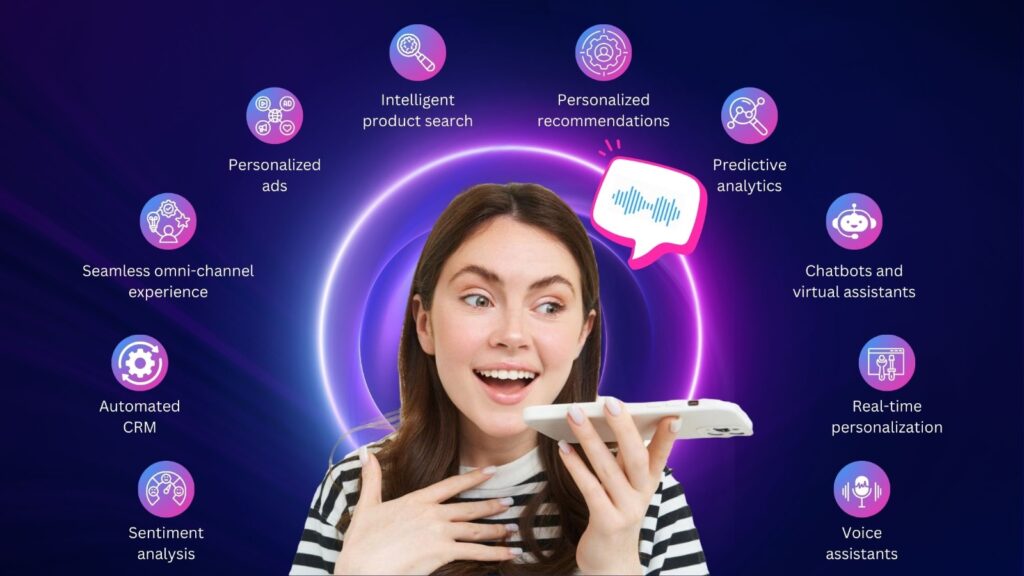
Taking a look at the figures, the positive impact of AI in CX is obvious as evidenced by its ability in:
- Intelligent product search: Enables customers to quickly and easily find the products they’re looking for, improving their search experience and increasing their satisfaction.
- Personalized recommendations: Delivers relevant and engaging ads to the right customers at the right time, enhancing their shopping experience and driving conversions.
- Personalized ads: For instantly elevated AI marketing for higher click-through rates (CTR) and reduced ad-spend waste.
- Seamless omni-channel experience: Provides a consistent and personalized experience across all channels, from online to offline, creating a seamless and enjoyable customer journey.
- Automated CRM: Automates customer relationship management tasks, allowing buyers to address issues with instant and efficient support.
- Sentiment analysis: Allows businesses to understand customer behavior and position ads/recommendations that tally with their expectations thereby saving search time or spamming them with unnecessary promotions.
- Predictive analytics: Anticipates customer needs and preferences that can zero-in to seasonal / festive preferences, enabling proactive and personalized services that is appreciated by customers.
- Chatbots and virtual assistants: Provide instant support, answer customer queries 24/7, and resolve issues quickly and efficiently, improving customer trust and reducing frustration.
- Real-time personalization: Delivers personalized experiences in real-time reading into the real-time search data of the customers, thereby presenting information as per their preferences as they interact with the brand.
- Voice assistants: Enable customers to interact with businesses using voice commands, providing a convenient and hands-free shopping experience.
Did you know, an unsuccessful search attempt can lead to 17% to 20% lost customers? AI in retail can remedy possible damages such as these and much more.
AI Marketing – Driving Retail Innovation
Examples like Sephora’s try and buy, Alibaba’s pervasive personalization, Starbucks’ Deep Brew Amazon’s product recommendations, and Alexa are clear indicators that the future of AI in retail is now. AI empowerment in marketing has enabled retailers with:
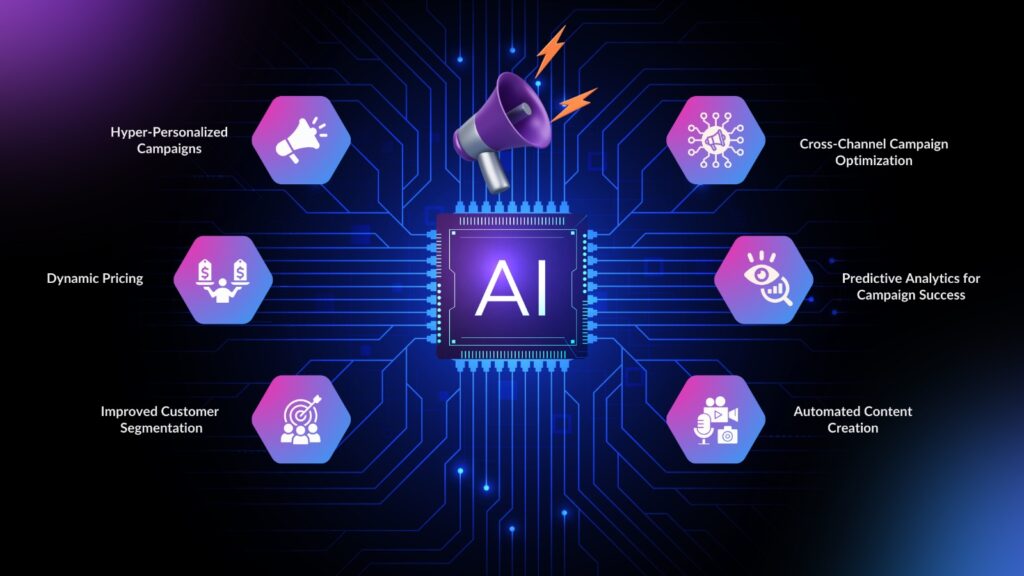
- Hyper-Personalized Campaigns: Creating highly personalized campaigns across various channels, like Sephora.
- Dynamic Pricing: Adjusting prices in real-time based on demand, competitor pricing, and customer willingness to pay, like Air-B&B.
- Improved Customer Segmentation: Identifying distinct customer segments based on their behavior, preferences, and demographics, like Shein.
- Cross-Channel Campaign Optimization: Analyzing the performance of marketing campaigns across different channels, like Starbucks and Heineken.
- Predictive Analytics for Campaign Success: Predict the likelihood of a customer responding to a specific campaign, like Macy’s and Nike.
- Automated Content Creation: Assisting in creating personalized content, such as social media posts and email campaigns.
AI Powered Personalization In Action – Real Brands, Real Cases
- Amazon: Amazon leverages AI, particularly its “Item-Based Collaborative Algorithm,” to analyze customer data and personalize product recommendations. This drives a significant portion of their revenue, with 35% attributed to these tailored suggestions. Amazon has even commercialized this technology through Amazon Personalize, offering it to other businesses.
- Starbucks: Starbucks utilizes AI to power its loyalty program, offering personalized rewards and promotions based on individual customer preferences. Their Deep Brew Data Analytics platform enables this level of personalization, leading to a highly successful program with over 40 million members and contributing 40% of the company’s sales.
- Sephora: Sephora employs AI across various touchpoints, from AI-powered chatbots that improve customer service to AI-driven SEO that enhances search visibility. Tools like Sephora Virtual Artist and Color Match leverage AI/AR for personalized experiences, boosting customer engagement and driving growth.
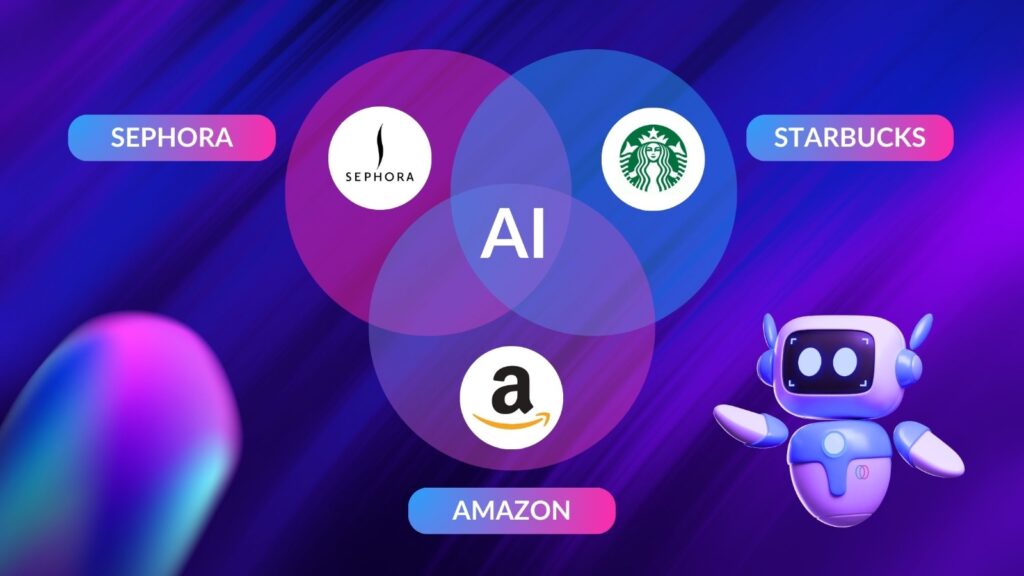
These examples demonstrate how AI is revolutionizing the retail industry by creating more personalized and engaging customer experiences.
Benefits of AI in Retail: Redefining Customer Journey
As per business forecasts, the market for AI in retail is expected to touch $24.1 billion by 2028,considering the breakneck speed at which retailers, whether giants, medium or small, are adopting AI powered strategies to maximize operational efficiency and customer engagement.
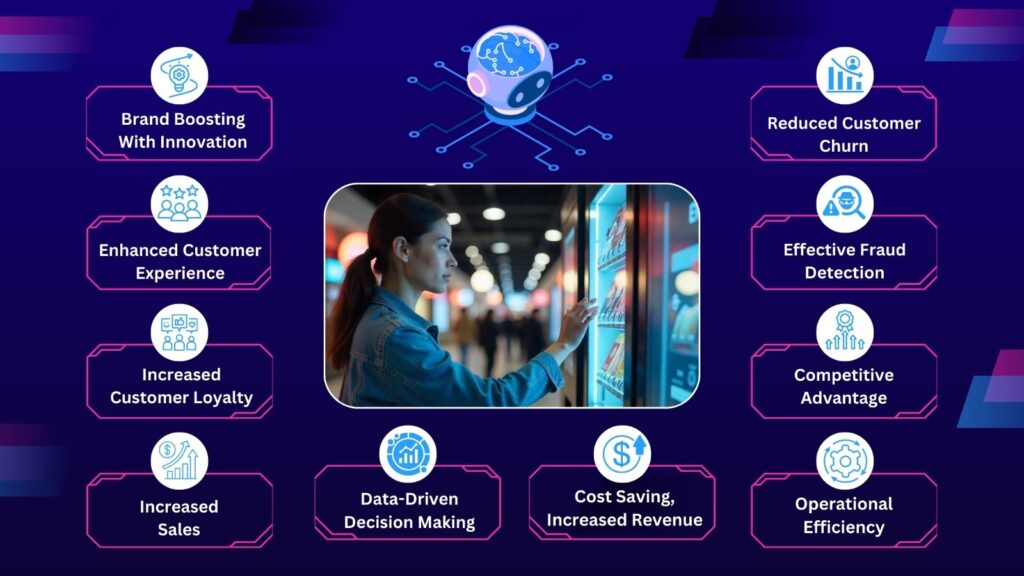
Some of the obvious benefits that is leading to the dedicated adoption of AI in retail include:
- Enhanced Customer Experience: 72% of customers respond to personalized communications/information. AI powered CX tools thus, help foster stronger relationships through personalized interactions and tailored experiences.
- Brand Boosting With Unending Innovation: AI marketing can be heavily customized and deployed in unique ways to compliment a brand’s individuality whether in product promotions, loyalty programs or marketing, which adds to its USP
- Increased Customer Loyalty: Builds brand loyalty by consistently meeting customer expectations with buyer centric approaches like hyper-personalization, gamification, rewards and more.
- Improved Customer Lifetime Value: AI marketing in retail encourages repeat purchases and long-term customer engagement. In fact, it can increase the customer life cycle by 20%.
- Reduced Customer Churn: Minimizes customer attrition by addressing customer concerns proactively and efficiently with AI powered customer support.
- Effective Fraud Detection: Detecting suspicious transactions or inconsistencies in product descriptions to prevent possible fraud. E.g., PayPal uses Deep Learning Fraud Detection, an AI powered system that prevents fraudulent transactions.
- Data-Driven Decision Making: Provides valuable insights for informed business decisions, from product development to personalization, marketing strategies etc. E.g., Starbucks Loyalty Program, Sephora, Walmart.
- Competitive Advantage: Differentiates businesses from competitors by offering unique and personalized customer experiences.
- Increased Sales: Expert forecasts reveal that AI in retail will generate a staggering $15.7 trillion (approx.) by 2035. Retail giants like Amazon and Walmart, as well as many niche retail brands are already experiencing the benefits of AI in sales generation.
- Operational Efficiency: AI automates tasks, streamlines processes, and reduces operational costs. E.g., Zolando decreased travel time for per item picked in their warehouse by 11% using AI powered Nvidia system for route optimization.
- Cost Saving, Increased Revenue and Profitability: Process automation, elimination of downtimes and price optimization combined, can drive YOY revenues and ROI while cutting down costs significantly. As per research, AI for price optimization can grow revenues by 1% to 5%.
Challenges of Implementing AI In Retail
While the potential of AI in retail is enormous, navigating its implementation across various sections of the industry presents several challenges.
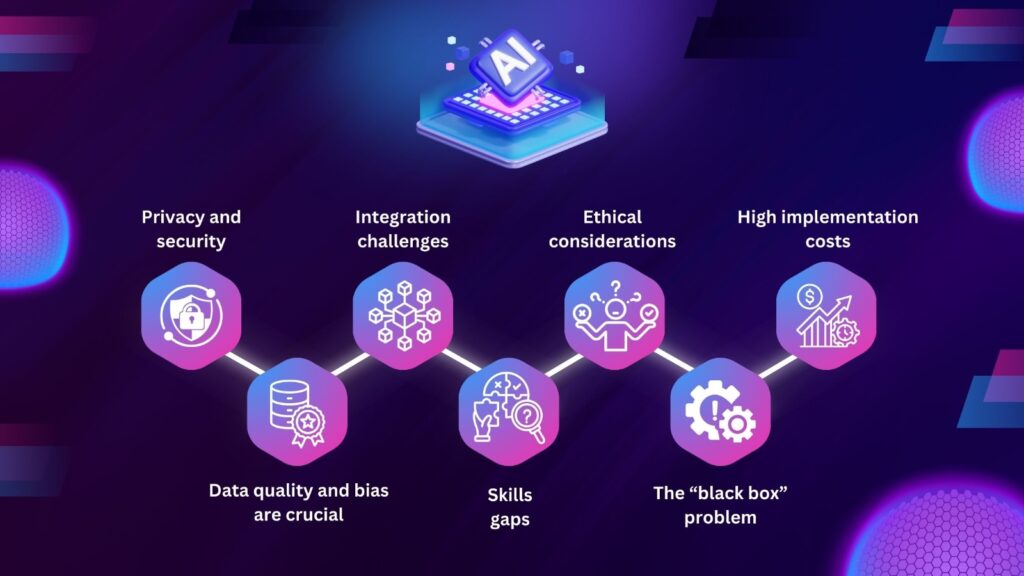
- Privacy and security are major concerns, with 44% of retail CEOs expressing worries about protecting sensitive customer data.
- Data quality and bias are crucial, as inaccurate or biased data can lead to flawed AI models and discriminatory outcomes.
- Integration challenges arise from procedural complexities while integrating AI with existing IT systems, that often require costly upgrades.
- The “black box” problem makes it difficult to understand how AI algorithms arrive at their decisions, raising concerns about transparency.
- Skills gaps exist among the AI workforce, requiring retailers to invest in training and development.
- Ethical considerations include potential job displacement and algorithmic bias.
- High implementation costs, including hardware, software, and skilled personnel, can be a significant barrier, particularly for smaller retailers.
By addressing these challenges proactively, retailers can unlock the full potential of AI while mitigating risks.
The Future Of AI In Retail: What To Look Forward To
The future of AI in retail foresees heavy democratization with AI technologies becoming more accessible and affordable to smaller retailers helping them leverage their capabilities to compete more effectively with larger players.
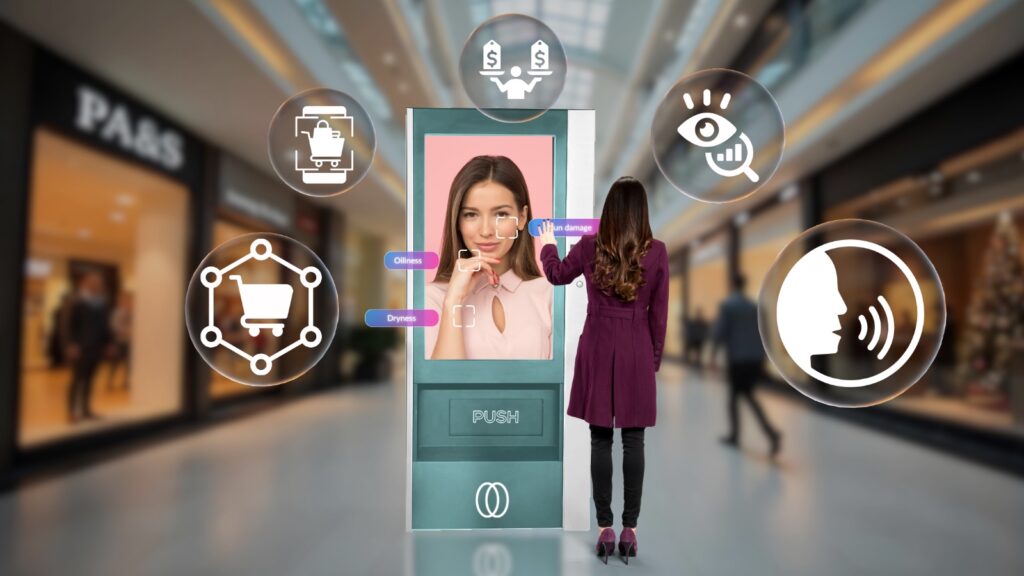
Other key future AI trends in retail include:
- AR Shopping: Immersive virtual try-on experiences enhance customer satisfaction and reduce returns.
- Predictive Analytics: Data-driven insights optimize inventory, forecast demand, and improve operational efficiency.
- Omni-channel Retail: Seamlessly connects online and offline channels for a unified customer experience.
- Dynamic Pricing: Real-time price adjustments based on market conditions maximize revenue and competitiveness.
- Voice Commerce: Hands-free shopping through voice assistants expands customer reach and convenience.
Other emerging trends include AI-powered product design, marketing campaigns, virtual assistants, loyalty programs, anomaly detection, and advanced personalization.
Conclusion: Transforming Retail With AI Powered Personalization
AI is revolutionizing retail, driving significant improvements in customer experience (90%), profit margins (60%), customer retention (20-30%), and supply chain costs (15%).
From personalized recommendations to predictive analytics, AI empowers retailers to connect with customers more effectively while optimizing operations and reducing costs significantly.
While challenges like data privacy exist, the future of AI in retail promises hyper-personalized experiences, stronger customer relationships, and sustainable growth.

